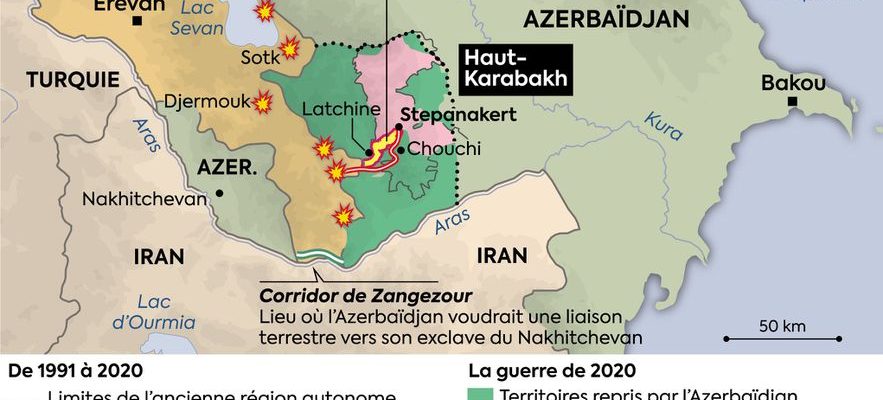These days, Nikol Pashinian spends his time on the phone. To Emmanuel Macron, Olaf Scholz, Antony Blinken and others, the Prime Minister expresses his deep concern. According to him, Azerbaijan is preparing nothing more and nothing less to annex Nagorno-Karabakh, an Armenian enclave in Azerbaijan and the subject of disputes for three decades between these two former Soviet republics of the Caucasus.
On September 7, Azeri military movements were observed near the Armenian borders. The noose is tightening around Nagorno-Karabakh, where the Lachin road, a veritable umbilical cord linking the enclave to Armenia, has remained inaccessible for almost nine months.
Supplies are so scarce that the 120,000 Armenians in Nagorno-Karabakh are on the verge of starvation. Residents get up at dawn and queue in front of stores for several days for a ration of bread… like in the dark hours of the Soviet Union. “They are held hostage in their homes,” explains Taline Papazian, director of the Armenia Peace Initiative who teaches at Sciences po Aix. Foreign observers no longer hesitate to use the term “ethnic cleansing” to designate the way the Azeri authorities seek to get rid of the Armenians of Nagorno-Karabakh.
The about-face against Putin
Due to this increasingly desperate situation, Nikol Pashinian believes less and less in Russian authority, although it is supposed to guarantee Armenia’s security. In power since 2018, the pragmatic Prime Minister has always been an ally of Vladimir Putin. But for some time now, Pashinian has been making an about-face. In an interview in the Italian newspaper La Repubblica, he described as a “strategic error” the security partnership “resting 99.999% on Russia”. The wife of the Prime Minister, she has met, on September 7, Ukrainian President Volodymyr Zelensky to clearly signal Yerevan’s solidarity with kyiv. A first for Armenia, which has never condemned the Russian invasion of 2022.
Map
© / Dario Ingiusto / L’Express
Nikol Pashinian’s actions shake up Moscow’s certainties: on September 13, a crime of lèse-majesté, the head of the Armenian government ratified the entirety of the Rome Statute of the International Criminal Court, which plans to arrest Vladimir Putin he had just set foot in Armenian territory. “Pachinian intends to diversify his security partnerships,” notes Benyamin Poghosyan, president of the Center for Strategic Political and Economic Studies in Yerevan. For him, it is above all a question of “irritating Russia and sending a message to the West”.
Engrossed by the war in Ukraine, Russia no longer seems able to stabilize relations between Armenia and Azerbaijan. Russian peacekeepers, who have been supposed to carry out a peacekeeping mission in Nagorno-Karabakh since 2020, are unable to fulfill their mission. The Collective Security Treaty Organization (CSTO), which brings together Armenia, Kazakhstan, Belarus, Kyrgyzstan and Tajikistan around Russia, does not obtain better results on the diplomatic field.
“Pachinian has never been anti-Russian, nor literally pro-Western,” explains Stephan Astourian, professor of international relations at the American University of Armenia. “He is a sovereignist who wants to defend the territorial integrity of Armenia, which has 2.8 million inhabitants.” “The Prime Minister knows perfectly well that the question of Nagorno-Karabakh remains a means for Russia to maintain influence in the Caucasus. He also knows that the power of nuisance of the Kremlin over Armenia is potentially so important that a rupture of relations is neither possible nor desirable,” adds Taline Papazian.
Declining popularity
The question of Nagorno-Karabakh, where Nikol Pashinian has not returned for three years [date de la défaite de l’Arménie dans la guerre contre l’Azerbaïdjan de 2020], would it be insoluble? In recent months, Pashinian’s meetings with his Azeri counterpart Ilham Aliev have become more frequent. And this year, under the aegis of France, the European Union, Russia or the United States, the two leaders met several times. But without ever finding an opening towards a peace agreement.
Pashinian’s powerlessness over Nagorno-Karabakh explains the growing mistrust of the Armenians. “Since Armenia’s defeat in 2020, its popularity has declined, due to the country’s very precarious situation in terms of territorial security,” explains Taline Papazian. In the last legislative elections of 2021, his “Civil Contract” party narrowly crossed the 50% mark, while in 2018, the same party triumphed with 70% of the votes.
In 2018, Pashinian, a former journalist and activist who became an opposition MP against former President Sirkassian, came to power in euphoria, after the “velvet revolution”. Thanks to anti-corruption reforms, he, who came from a modest provincial family, quickly became very popular with the working classes. But those happy times seem far away.
Tensions with Azerbaijan could further destabilize the Prime Minister, even if the issue of Nagorno-Karabakh becomes less and less important in the eyes of part of the Armenian population. “While in the 2010s, the question of Nagorno-Karabakh was fundamental for the destiny of the Armenian elites, a dissociation is taking place,” according to Taline Papazian. The municipal elections which will take place this Sunday September 17 will serve as a test. And will indicate whether Nikol Pashinian’s popularity is determined, or not, by the Karabakh question.
